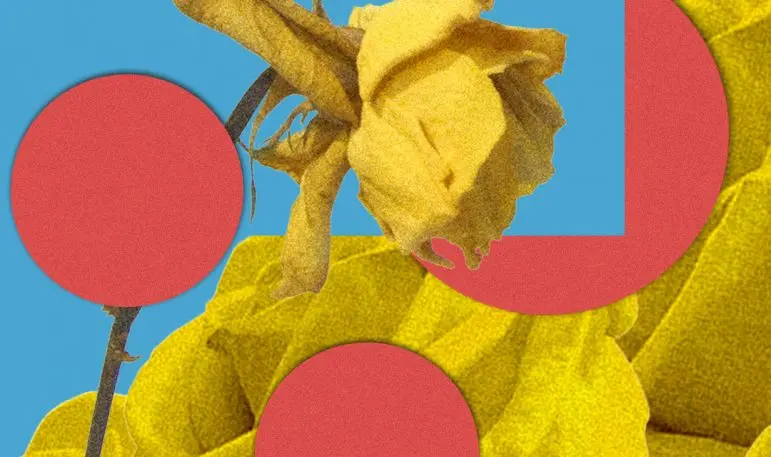As the negative impact of social media on our brains–and our democracy–continues to emerge, it’s a question many people are reckoning with: Should I delete my Facebook, Twitter, or Instagram?
For many creatives, including independent artists and freelancers, it’s complicated by the fact that business today is often done on social platforms. “I feel like I need to be on social media to know what’s going on in the world, to stay close with my friends, for professional reasons, and simply to stay relevant,” as one anonymous writer put it in the advice section of The Creative Independent, the online resource for creative people.
So, should you delete your social media? The Creative Independent posed the question to artists, producers, and writers, whose responses ran the gamut from “abso-fucking-lutely” to advice on how to modulate your online life and creative practice.

Take a month off
The artist Taeyoon Choi suggests taking a break and reconnecting in real-world ways:
“I’ve had the same questions, then deleted some accounts, eventually remade those accounts, and repeat. Social media products are engineered to be addictive by offering quick psychological rewards. They can also be extremely hurtful and disorienting, and can lead you into a mild or even severe depression. This is the effect of what philosopher Bernard Stiegler calls ‘psychopower,’ or the capture of attention by technological means, in [the article] “Biopower, psychopower and the logic of the scapegoat.” And, although social media provides easy and instant access to others, the interactions are shallow and constrained. We’ve traded the ‘tradition of solitary, single-minded concentration’ and now act like ‘jugglers’ of attention, as Nicholas Carr explains in The Shallows: What the Internet Is Doing to Our Brains.
“If you are feeling like social media is wasting your time and giving you anxiety, I suggest you have a break from all of it for one month and see how you feel. In the meantime, find other ways of connecting with people via direct email, meeting up in real life, and going to events and parties as much as you can. You may find more joy in interacting with people this way, and the experience can make you not miss social media. Also, journaling is a very good alternative to posting thoughts on social media. So is sending letters to friends.
“Ideally, you want to be able to enjoy social media for entertainment, socializing, and professional development on your own terms. When you use social media with self control, you can connect with friends far and wide, and get exciting opportunities that you might not be able to find otherwise. For example, I had a friend who lived in a remote area, far away from any contemporary creative scene. She used social media to learn about what was happening in arts and culture, and also as a way to share what she was working on. For her, social media was a vein for sustaining her creative life.
“I also use social media to share my work progress, ideas, and finished projects. I’ve received some amazing professional opportunities in museums and at festivals thanks to exposure from social media. One rule I keep, though, is that for finished projects, I try to post about them on my professional website first, with all necessary documentation and text before posting on social media. This helps me to prioritize the quality of my work instead of the immediate satisfaction and approval of peers that social media offers. I also post daily photos on the School for Poetic Computation’s social media, because I know it means a lot for our community to see and hear what we are doing. However, it’s very important to have boundaries between work and life, and exposure and intimacy.
“If you are checking social media more than once every hour, for more than a few minutes at a time, it’s clearly become a distraction from being present and engaged in your world. Your world is more complex, beautiful, and meaningful than other people’s worlds represented on social media. It’s your job to cultivate your life, relationships, and practice, and keep social media at arm’s length when necessary.”
Change your settings
Visual artist Addie Wagenknecht points out that you can tweak your phone’s settings:
“The first thing I always suggest to anyone feeling this way (and you’re not alone!) is to turn off all the notifications for your social media apps so you aren’t responding to their every beckoning chirp. The only notifications I have active on my phone are incoming calls and texts. This way people can still reach me when they need to, but when I’m going to bed, even those notifications go into airplane mode. As a result of not receiving every single ‘like’ as a notification, what happens is that I only check Instagram/Twitter/Reddit when I actually want to. That could mean I won’t see a notification for a few minutes, a few hours, or even a few days. I don’t even have Facebook on my phone anymore, so as a result, I check that even less. I do this because I find the noise-to-signal ratio on Facebook to be the highest for me, and therefore try to stay away as much as I can.
“When I feel that my use of social media is just bringing on more toxic feelings than good, I sometimes completely uninstall all the apps for a while, and ask any friends or family I regularly speak with on those platforms to contact me in another way (like through text or email). Professionally, if I just want to be off social media but still need to stay active, I find the best way is to go on, post what I need to post, and then get off again without looking at the feed, likes, notifications, etc.
“Overall, you don’t have to take an all-or-nothing approach to social media—instead, there are small changes you can make to your habits and alert settings that can make a big difference.”

Deactivation is your friend
Writer Kimberly Harrington describes how she limits herself by deleting apps:
“I shudder to think of the actual months—if not entire years—I have wasted scrolling, retweeting, clicking, filtering, posting, editing, and sharing. I have both made and lost friends, secured paying projects, made incredible connections, fortified long-forgotten networks and relationships, and suffered staggering bouts of insecurity and envy all due to social media.
“TL;DR—I feel you.
“My advice is to look for the gray area between your black-and-white questions. This doesn’t have to be an all (keep everything, don’t change a thing) or nothing (delete every account you have) situation. Think about each platform and what you don’t like about it and how you could change it. The answer might be ‘delete it entirely’ or it might just be ‘unfollow people who make me want to throw myself off a bridge.’ For example, on Twitter I follow mostly comedy writers, authors, journalists, and a few goofballs. I focused on people I wanted to hear from or be entertained by, and incredibly that’s resulted in actually enjoying Twitter. For Facebook, I regularly deactivate my account because I couldn’t take the toxic negative hellscape it’s become and I can barely manage my base-level negative emotions as it is. On Instagram, I unfollowed anyone who made me feel like shit about my life, whether that meant they had a great summer house I wish I had, a great ass I also wish I had, or a giant pile of money which I definitely still wish I had—no matter how much I might like them personally.
“The difference between a person and ‘their brand’ is real. And it’s okay to hate the brand and not want it in your life. Also: I had to start absorbing that my reactions to how other people lived their lives was not their problem but mine. I started to question and work through what triggered me about each of these interactions. What was I insecure about? What did that person (or image or caption) bring out in me? My aunt once told me, ‘People are put in your path for a reason,’ and I remember that every time I have an outsize reaction to something I see on social media.
“As long as I’m not traveling, I delete most social apps from my phone so when I’m stuck in a line somewhere or waiting for an appointment I’ll choose to read a book instead of being tempted to scroll until I hate all of humanity. You get the idea. I basically try to alter, change, or focus my access and who I’m listening to, seeing, interacting with. If you find that those adjustments aren’t enough then, yes, leave/deactivate/delete. Or leave some and not others. Whatever you choose, you will not regret it. You want to make a change (otherwise, why ask for advice?) so find the places where you can do that. You will adjust to it. You will feel better. It will be worth it.
“One last story: A friend of mine hopped off of all social media this past summer. I didn’t notice at first but then I received a handwritten letter (!) congratulating me on my book. I wrote her an email to thank her for, again, writing me AN ACTUAL HANDWRITTEN LETTER (!) and that’s when she texted me a voice memo. We’ve been exchanging these voice memos almost everyday since, even though she’s now back on social media. It’s like a weird one-sided phone call that you can fit into anytime of your day, a 15- or 20-minute self-therapy session where you talk about anything that’s on your mind, and there is nothing to like, see, or comment on. It’s brought back what I miss most about pre-social media days—the actual social part, the personal connection, the TALKING, the long-form responses to ideas, thoughts, and stories. I bring this up because it’s an idea that deserves to catch on. Our messages have inspired me to look up things she’s mentioned, learn more about projects she’s working on, and ultimately we’ve learned a lot about each other that we would’ve never gleaned from just interacting on social media. It’s just . . . fun.
“Social media isn’t going away anytime soon. Try to find ways it can be more helpful, more satisfying, more entertaining, more truly social, and less of all the other things you don’t like. You know, sort of like life.”

At the end of the day, your career doesn’t depend on your visibility
Music journalist Sasha Hecht offers a perspective check:
“Social media apps are like an emotionally abusive partner. They break our trust over and over, each time apologizing and promising it will never happen again. They insist that they only exist as a resource to serve us and enrich our lives, while at the same time reverse-engineering our minds to believe that we would be nothing without them. They deliberately manipulate our emotions to keep us engaged. They control our channels of communication with our friends and loved ones. They hold all of our secrets and know that it’s too late for us to do anything about it.
“So is there a reason to stay? Is social media really making us more informed as to what’s going on in the world? Or are we becoming less media-literate as we tacitly accept that the ‘news of the day’ begins and ends with whatever clickbait headlines we scroll past in our respective information silos? Are we really becoming more connected to our friends and family? Or are we losing what it means to cultivate, develop, and maintain relationships in exchange for ease and convenience? Does being more visible really make us more ‘relevant’? Or has our foundational understanding of ‘relevance’ (people engaging with our content, presumably) been manipulated by algorithms that reward us by highlighting certain posts depending on how much time/energy/content we contribute to their platforms?
“Deleting your social media can feel like erasing a part of your identity, I get that, but I promise you that there is life afterward. It changes things, for sure, but what’s almost more striking is how much stays the same. Contrary to popular belief, you do not begin to fade into oblivion Marty McFly-style as soon as you delete your social media. Your family and friends will still care about you, you’ll still be just as much a part of the world (if not more so), and you’ll be totally amazed at what you can get done when you’re forced to focus your attention on literally anything else. So just fucking do it. Download your file/archive from each platform (it’s easy, look it up), delete your social media accounts, and go make something cool. You can always go back, so really, what do you have to lose?”
To read more advice for creative people, or to ask your own question, visit The Creative Independent.
Recognize your company's culture of innovation by applying to this year's Best Workplaces for Innovators Awards before the extended deadline, April 12.